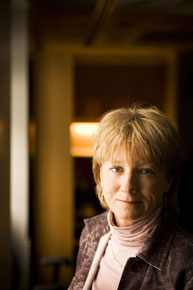Molecular insights into cancer fight
Molecular insights into cancer fight McGill University
User Tools (skip):
Molecular insights into cancer fight
When cancer researcher Morag Park began her BSc at Glasgow University in the mid-70s, her after-graduation plan was to become a public school biology teacher. She quickly switched paths, though, when she found herself in the midst of a scientific revolution.

Prof. Morag Park
"I came into science at the beginning of what we now call molecular biology. It was an extremely exciting time. In molecular biology, you can really begin to understand all of the events of the cell and test them by making changes in the genome," said the Professor of Biochemistry, Oncology and Medicine and Director of the Molecular Oncology Group at the Royal Victoria Hospital. Her fascination led her to do a PhD in Glasgow, then carried her across the Atlantic in 1983 to do post-doctoral research as a Fogarty Fellow at the National Cancer Institute in Washington, D.C.
Her research there resulted in the breakthrough discovery of the Met receptor tyrosine kinase, which plays a role in healthy cell organization and movement but, in cancer patients, can malfunction, causing cells to become invasive.
A member of McGill's research community since 1989, Prof. Park became Director, in 2006, of the Molecular Oncology Group (MOG), whose main goal is to understand the molecular changes that occur as cancer develops.
She also oversees the Breast Cancer Functional Genomics Group, which uses cutting-edge genomics technologies to take "snapshots" of what is happening in tumours on a molecular level and sophisticated mouse models to test potential therapies.
Just as the advent of molecular biology in the 70s fired her scientific imagination, so, clearly, have recent advances in molecular oncology. "From a breast cancer perspective, what's most exciting is the fact that, now, rather than looking at the tumour as a whole we can subdivide it. What we've obtained is a picture of the changes that are happening in the tumour as well as its surroundings. By doing that, we've begun to identify changes in the environment that clearly affect the ability of the tumour to metastasize."
According to Prof. Park, since she came to North America in 1983, laboratory advances such as these have not only deepened our theoretical knowledge of cancer but made a significant difference in patients' lives.
"Progress has been huge, with leukemias especially. Even breast cancer is essentially becoming what you would call a chronic disease, a bit like diabetes."
In addition to the excitement she gets from promising new research and treatment developments, she also derives a good portion of her professional fulfillment from watching her students develop. "These are young kids and I think what's really exciting is they come into your lab and they make discoveries. It's thrilling to watch them," she said.
Search
Search (skip):
Breast cancer lecture
Who: Breast Cancer Fund
Executive Director Jeanne Rizzo.
What: This year's Muriel V. Roscoe Annual Lecture and the Lanie Melamed Memorial Lecture.
Where: New Residence Hall, Ballroom A, 3625 Parc.
When: 6 p.m. Tuesday, March 13.
Why: To hear about the need for chemical policy reform as a means of preventing the disease that kills 102 Canadian women each week.
How: Free, sponsored by the McGill Centre for Research and Teaching on Women, the McGill Women's Alumnae Association and Breast Cancer Action Montreal.

